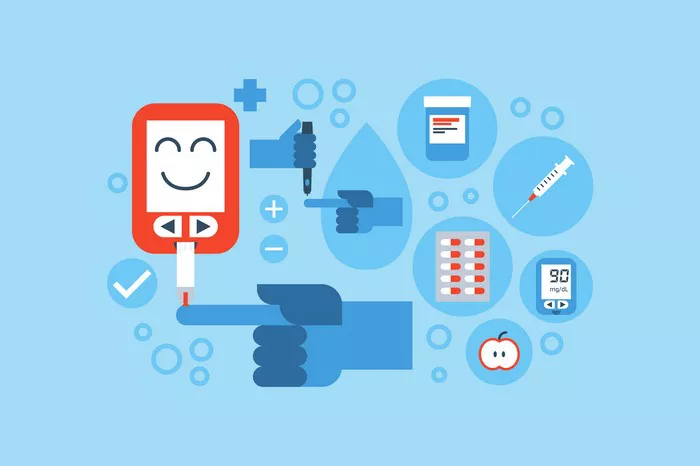Type 1 diabetes (T1D) is a chronic autoimmune condition characterized by the destruction of insulin-producing beta cells in the pancreas, leading to insulin deficiency and dysregulation of blood glucose levels. The onset of T1D is often abrupt, with symptoms developing rapidly over a short period. In this comprehensive article, we explore the early signs and symptoms of T1D, discuss the diagnostic process, and outline the principles of management for individuals with this condition.
1. Early Signs and Symptoms:
The symptoms of type 1 diabetes typically develop over a period of days to weeks and may vary in severity among individuals. Common early signs and symptoms of T1D include:
- Excessive thirst (polydipsia): Increased thirst is often one of the earliest symptoms of T1D, as elevated blood glucose levels lead to dehydration.
- Frequent urination (polyuria): Excessive urination is a result of the kidneys’ efforts to eliminate excess glucose from the bloodstream through urine.
- Unexplained weight loss: Despite increased appetite and food intake, individuals with T1D may experience rapid and unexplained weight loss due to the loss of calories through urine and the body’s inability to utilize glucose for energy.
- Fatigue: Persistent fatigue and weakness are common symptoms of T1D, as cells are deprived of glucose, their primary source of energy.
- Blurred vision: High blood glucose levels can cause changes in the shape of the lens of the eye, leading to blurred vision and other visual disturbances.
- Increased appetite (polyphagia): Individuals with T1D may experience excessive hunger due to the body’s inability to use glucose for energy, despite increased food intake.
- Irritability and mood changes: Fluctuations in blood glucose levels can affect mood and behavior, leading to irritability, mood swings, and difficulty concentrating.
It is essential to recognize these early signs and symptoms of T1D and seek medical attention promptly for proper evaluation and diagnosis.
2. Diagnostic Process:
The diagnosis of type 1 diabetes is based on clinical symptoms, blood glucose levels, and laboratory tests. The diagnostic process typically involves the following steps:
- Medical history and physical examination: Healthcare providers will review the individual’s medical history, including symptoms, family history of diabetes, and any relevant risk factors. A physical examination may also be performed to assess for signs of diabetes-related complications.
- Blood glucose testing: Blood glucose levels are measured using a fasting plasma glucose (FPG) test, oral glucose tolerance test (OGTT), or random plasma glucose test. Elevated blood glucose levels (usually above 126 mg/dL fasting or 200 mg/dL random) indicate hyperglycemia and may suggest diabetes.
- Glycated hemoglobin (HbA1c) test: The HbA1c test measures the average blood glucose levels over the past two to three months. Elevated HbA1c levels (usually above 6.5%) are indicative of poorly controlled diabetes.
In addition to blood glucose testing, individuals may undergo laboratory tests to assess for the presence of autoantibodies targeting pancreatic islet cells, such as anti-glutamic acid decarboxylase (GAD) antibodies, anti-insulin antibodies, and anti-islet cell antibodies. The presence of these autoantibodies confirms the autoimmune nature of T1D.
3. Management of Type 1 Diabetes:
Once diagnosed, the management of type 1 diabetes focuses on achieving and maintaining euglycemia (normal blood glucose levels) while minimizing the risk of acute and chronic complications. The key components of T1D management include:
- Insulin therapy: Individuals with T1D require lifelong insulin therapy to replace the deficient hormone and regulate blood glucose levels. Multiple insulin formulations are available, including rapid-acting, short-acting, intermediate-acting, and long-acting insulins, each with distinct onset and duration of action. Insulin therapy may be delivered via multiple daily injections or continuous subcutaneous insulin infusion (insulin pump therapy), depending on individual preferences and treatment goals.
- Blood glucose monitoring: Regular monitoring of blood glucose levels is essential for assessing glycemic control, adjusting insulin doses, and preventing acute and chronic complications. Self-monitoring of blood glucose (SMBG) using a glucometer or continuous glucose monitoring (CGM) systems provides individuals with real-time information about their glucose levels and helps guide treatment decisions.
- Carbohydrate counting and meal planning: Dietary interventions play a crucial role in T1D management, as carbohydrate intake directly affects blood glucose levels. Carbohydrate counting involves estimating the amount of carbohydrates in meals and matching insulin doses accordingly. Meal planning emphasizes a balanced diet rich in fruits, vegetables, whole grains, lean protein, and healthy fats, with an emphasis on portion control and glycemic index/load considerations.
- Physical activity: Regular physical activity is beneficial for individuals with T1D as it improves insulin sensitivity, enhances cardiovascular health, and helps manage weight. However, exercise can also affect blood glucose levels, requiring adjustments to insulin doses or carbohydrate intake to prevent hypoglycemia or hyperglycemia during and after physical activity.
- Psychosocial support: Living with T1D can have a significant psychosocial impact on individuals and their families, requiring ongoing support and education to cope with the challenges of the condition. Diabetes education programs, support groups, and counseling services offer opportunities for individuals to learn about T1D management, share experiences, and receive emotional support.
4. Complications and Long-Term Outlook:
Despite advancements in T1D management, the condition is associated with an increased risk of acute and chronic complications if not adequately controlled. Acute complications of T1D include hypoglycemia (low blood glucose levels), hyperglycemia (high blood glucose levels), and diabetic ketoacidosis (DKA), a life-threatening condition characterized by severe hyperglycemia, dehydration, and metabolic acidosis.
Chronic complications of T1D may affect various organs and systems, including the eyes (diabetic retinopathy), kidneys (diabetic nephropathy), nerves (diabetic neuropathy), and cardiovascular system (heart disease, stroke). Close monitoring, adherence to treatment regimens, and regular medical follow-up are essential to prevent or delay the onset of complications and improve long-term outcomes.
5. Conclusion:
In conclusion, recognizing the early signs and symptoms of type 1 diabetes is crucial for prompt diagnosis and initiation of treatment. Early intervention with insulin therapy, blood glucose monitoring, dietary interventions, physical activity, and psychosocial support is essential for achieving optimal glycemic control, preventing complications, and improving long-term outcomes for individuals with T1D.
By raising awareness, promoting early detection, and providing comprehensive care and support services, we can empower individuals with T1D to effectively manage their condition, minimize the impact of diabetes-related complications, and lead healthy, fulfilling lives. Continued research and innovation in T1D management hold promise for further improving outcomes and ultimately finding a cure for this chronic condition.

























